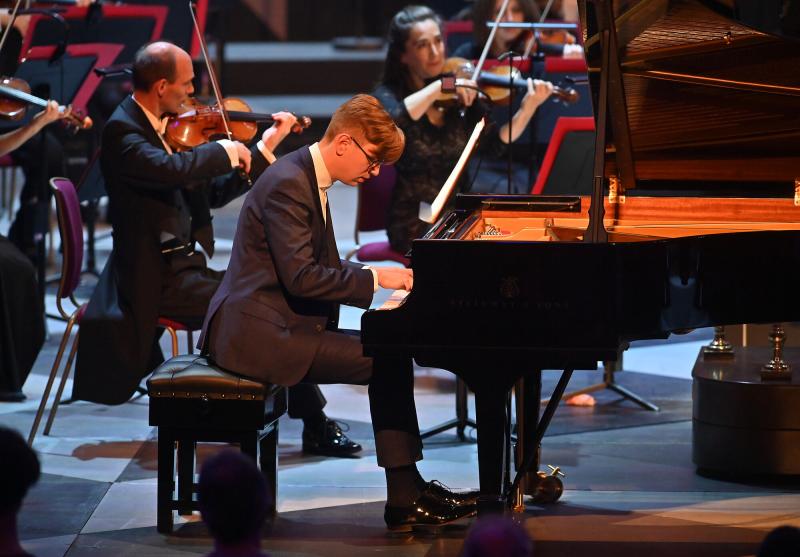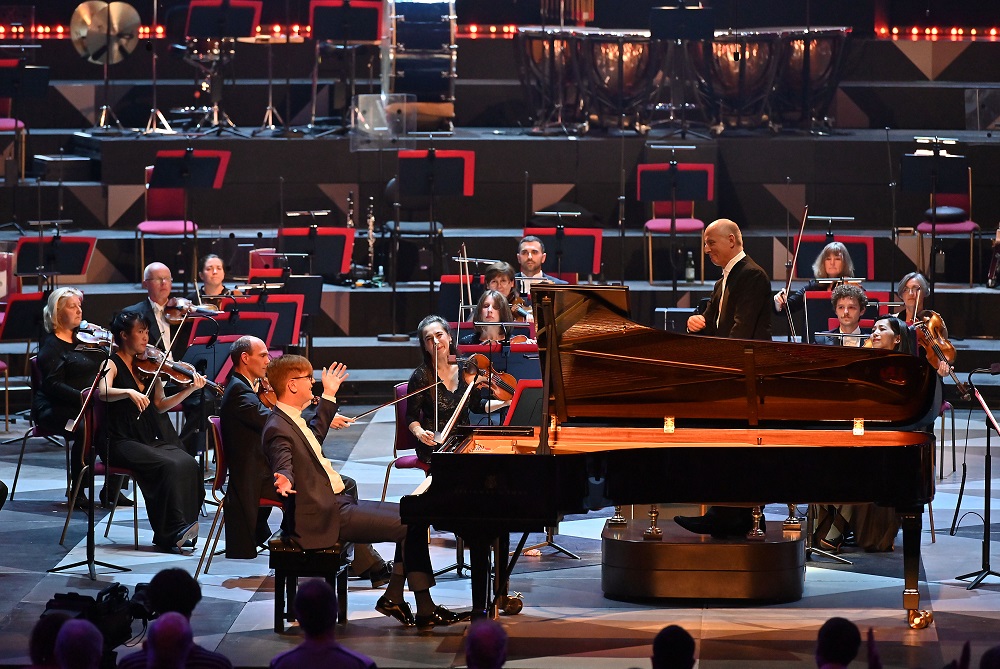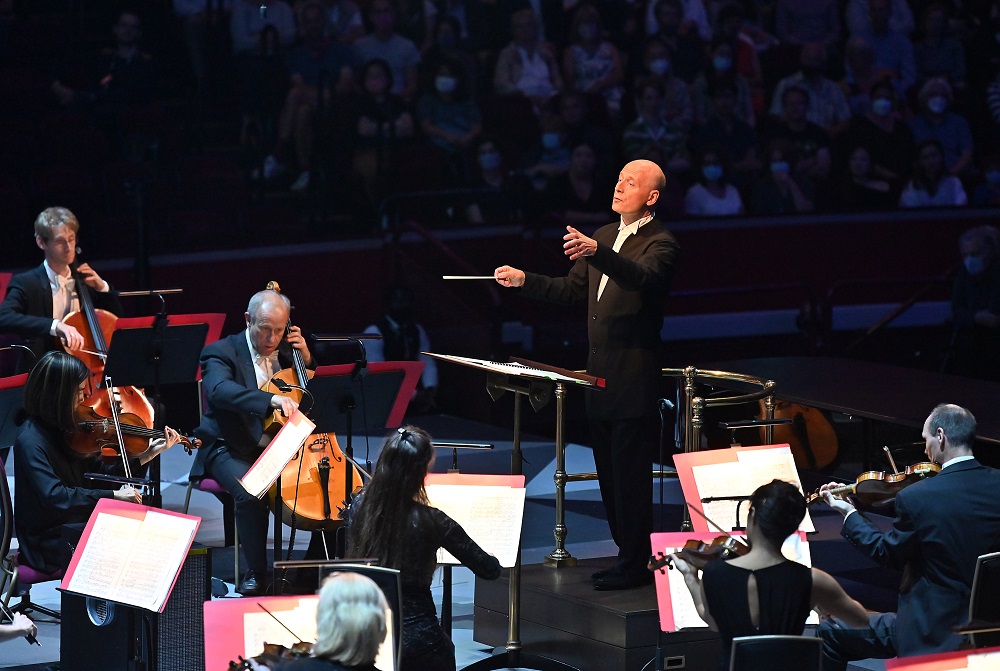Ólafsson, Philharmonia, Järvi, BBC Proms review - a ravishing Proms debut | reviews, news & interviews
Ólafsson, Philharmonia, Järvi, BBC Proms review - a ravishing Proms debut
Ólafsson, Philharmonia, Järvi, BBC Proms review - a ravishing Proms debut
Musical time-travel from top Icelander, Estonian and great London orchestra

What does it mean to be Classical? It’s the question award-winning Icelandic pianist Víkingur Ólafsson has consistently asked in a career that has collided music from Bach to Debussy, presenting them as part of a single conversation and continuum.
A late substitute for the Philharmonia’s new music director Santtu-Matias Rouvali (a casualty of pandemic travel logistics), Järvi was able to present the programme unchanged, preserving the careful logic that took us from the neoclassical wit and affection of Prokofiev’s First Symphony to the bitter, backward-glancing mischief of Shostakovich’s Ninth – two works that play with scope of both forces and duration, asking us to measure them up against 18th-century models and laugh at distortions, interrogate exaggerations.
More of those later. But first Ólafsson, the reason – surely – the Royal Albert Hall was almost back to normal capacity after a sparse couple of weeks. It may have been his first time at the Festival, but the 37-year-old pianist proved that he more than has the measure of this trickiest of spaces and its audience.  Playing Bach on a modern concert-grand, with a Shostakovich-sized string section behind him, he quickly rejected any sense of pastiche. Where there were moments of quiet in Bach’s F minor Keyboard Concerto (and you could almost hear the scuttle of the Royal Albert Hall’s many mice as we leaned in as one to hear Ólafsson spin the right-hand melody of the Largo as if from a spider’s web) they were choices, recalibrations. The limpid horizon-line of sound startled amongst the strikingly vertical playing of the outer movements, rhythms and counterpoint punched out with absolute clarity.
Playing Bach on a modern concert-grand, with a Shostakovich-sized string section behind him, he quickly rejected any sense of pastiche. Where there were moments of quiet in Bach’s F minor Keyboard Concerto (and you could almost hear the scuttle of the Royal Albert Hall’s many mice as we leaned in as one to hear Ólafsson spin the right-hand melody of the Largo as if from a spider’s web) they were choices, recalibrations. The limpid horizon-line of sound startled amongst the strikingly vertical playing of the outer movements, rhythms and counterpoint punched out with absolute clarity.
There was more of that verticality in Mozart’s C Minor Piano Concerto No. 24, where Ólafsson’s lines dropped like pebbles through the orchestra’s translucent texture. Cadenzas managed to look both back to Bach and forward to Chopin, drawing out the commonalities and the continuity – a gesture elegantly extended in two encores, where we heard Bach and Mozart again but this time through 19th-century ears, in transcriptions by Stradal and Liszt. As Ólafsson left (the audience would happily have kept him at it all evening) it felt like the conversation was just beginning.  But Järvi and the Philharmonia were there to keep it going. After an unexpectedly ruminative account of the Prokofiev, finding the wit but scaling it back from public joke to whispered aside, the Gavotte just a little too nice, too polite for the space, the Shostakovich had welcome breadth. The trombones had been waiting all night for their punchlines and didn’t hold back, but it was the orchestra’s wind section who were the stars here – whether Emily Hultmark’s bassoon, crooning out its haunting, horrifying song, or the progressive chill that moved through through clarinet, flute, horn and piccolo, recasting Mozartian wind-band sonorities as something more sinister.
But Järvi and the Philharmonia were there to keep it going. After an unexpectedly ruminative account of the Prokofiev, finding the wit but scaling it back from public joke to whispered aside, the Gavotte just a little too nice, too polite for the space, the Shostakovich had welcome breadth. The trombones had been waiting all night for their punchlines and didn’t hold back, but it was the orchestra’s wind section who were the stars here – whether Emily Hultmark’s bassoon, crooning out its haunting, horrifying song, or the progressive chill that moved through through clarinet, flute, horn and piccolo, recasting Mozartian wind-band sonorities as something more sinister.
Only in the closing Allegro did we realise how much Järvi had been keeping in reserve. So effectively had he and Ólafsson reset our ears, that Shostaovich’s finale arrived with all the shock of 1945 – a journey through time achieved with serious skill and just a sprinkle of musical wizardry.
rating
Share this article
The future of Arts Journalism
You can stop theartsdesk.com closing!
We urgently need financing to survive. Our fundraising drive has thus far raised £49,000 but we need to reach £100,000 or we will be forced to close. Please contribute here: https://gofund.me/c3f6033d
And if you can forward this information to anyone who might assist, we’d be grateful.

Subscribe to theartsdesk.com
Thank you for continuing to read our work on theartsdesk.com. For unlimited access to every article in its entirety, including our archive of more than 15,000 pieces, we're asking for £5 per month or £40 per year. We feel it's a very good deal, and hope you do too.
To take a subscription now simply click here.
And if you're looking for that extra gift for a friend or family member, why not treat them to a theartsdesk.com gift subscription?
more Classical music
 Lammermuir Festival 2025 review - music with soul from the heart of East Lothian
Baroque splendour, and chamber-ensemble drama, amid history-haunted lands
Lammermuir Festival 2025 review - music with soul from the heart of East Lothian
Baroque splendour, and chamber-ensemble drama, amid history-haunted lands
 BBC Proms: Steinbacher, RPO, Petrenko / Sternath, BBCSO, Oramo review - double-bill mixed bag
Young pianist shines in Grieg but Bliss’s portentous cantata disappoints
BBC Proms: Steinbacher, RPO, Petrenko / Sternath, BBCSO, Oramo review - double-bill mixed bag
Young pianist shines in Grieg but Bliss’s portentous cantata disappoints
 theartsdesk at the Lahti Sibelius Festival - early epics by the Finnish master in context
Finnish heroes meet their Austro-German counterparts in breathtaking interpretations
theartsdesk at the Lahti Sibelius Festival - early epics by the Finnish master in context
Finnish heroes meet their Austro-German counterparts in breathtaking interpretations
 Classical CDs: Sleigh rides, pancakes and cigars
Two big boxes, plus new music for brass and a pair of clarinet concertos
Classical CDs: Sleigh rides, pancakes and cigars
Two big boxes, plus new music for brass and a pair of clarinet concertos
 Waley-Cohen, Manchester Camerata, Pether, Whitworth Art Gallery, Manchester review - premiere of no ordinary violin concerto
Images of maternal care inspired by Hepworth and played in a gallery setting
Waley-Cohen, Manchester Camerata, Pether, Whitworth Art Gallery, Manchester review - premiere of no ordinary violin concerto
Images of maternal care inspired by Hepworth and played in a gallery setting
 BBC Proms: Barruk, Norwegian Chamber Orchestra, Kuusisto review - vague incantations, precise laments
First-half mix of Sámi songs and string things falters, but Shostakovich scours the soul
BBC Proms: Barruk, Norwegian Chamber Orchestra, Kuusisto review - vague incantations, precise laments
First-half mix of Sámi songs and string things falters, but Shostakovich scours the soul
 BBC Proms: Alexander’s Feast, Irish Baroque Orchestra, Whelan review - rapturous Handel fills the space
Pure joy, with a touch of introspection, from a great ensemble and three superb soloists
BBC Proms: Alexander’s Feast, Irish Baroque Orchestra, Whelan review - rapturous Handel fills the space
Pure joy, with a touch of introspection, from a great ensemble and three superb soloists
 BBC Proms: Moore, LSO, Bancroft review - the freshness of morning wind and brass
English concert band music...and an outlier
BBC Proms: Moore, LSO, Bancroft review - the freshness of morning wind and brass
English concert band music...and an outlier
 Willis-Sørensen, Ukrainian Freedom Orchestra, Wilson, Cadogan Hall review - romantic resilience
Passion, and polish, from Kyiv's musical warriors
Willis-Sørensen, Ukrainian Freedom Orchestra, Wilson, Cadogan Hall review - romantic resilience
Passion, and polish, from Kyiv's musical warriors
 BBC Proms: Faust, Gewandhausorchester Leipzig, Nelsons review - grace, then grandeur
A great fiddler lightens a dense orchestral palette
BBC Proms: Faust, Gewandhausorchester Leipzig, Nelsons review - grace, then grandeur
A great fiddler lightens a dense orchestral palette
 BBC Proms: Jansen, Royal Concertgebouw Orchestra, Mäkelä review - confirming a phenomenon
Second Prom of a great orchestra and chief conductor in waiting never puts a foot wrong
BBC Proms: Jansen, Royal Concertgebouw Orchestra, Mäkelä review - confirming a phenomenon
Second Prom of a great orchestra and chief conductor in waiting never puts a foot wrong
 BBC Proms: Royal Concertgebouw Orchestra, Mäkelä review - defiantly introverted Mahler 5 gives food for thought
Chief Conductor in Waiting has supple, nuanced chemistry with a great orchestra
BBC Proms: Royal Concertgebouw Orchestra, Mäkelä review - defiantly introverted Mahler 5 gives food for thought
Chief Conductor in Waiting has supple, nuanced chemistry with a great orchestra

Add comment